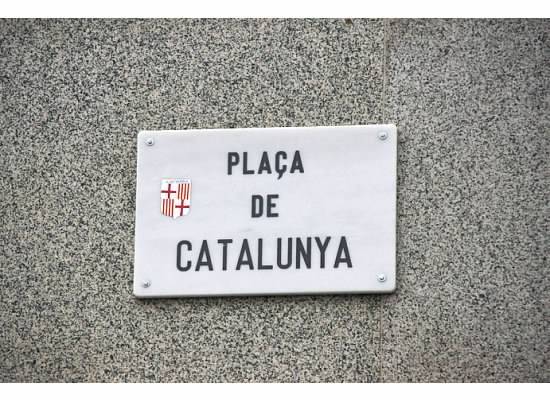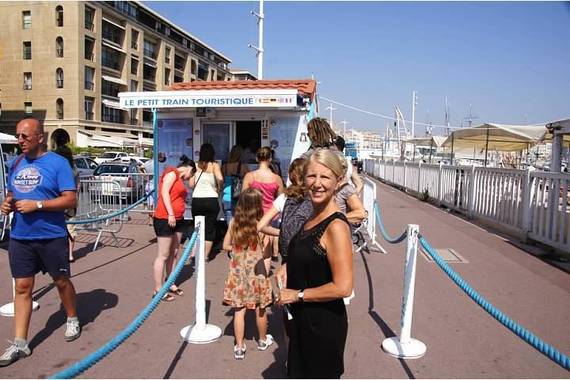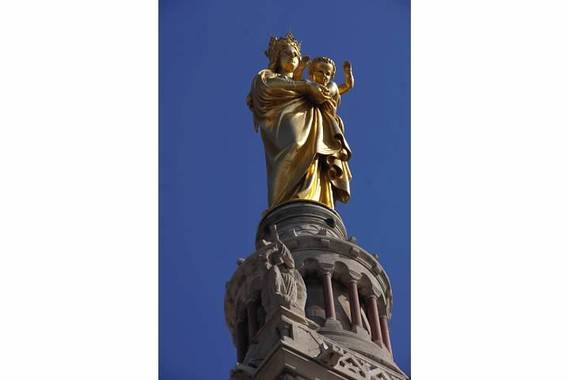Language is a subtle art. Over the course of twelve months backpacking across Europe on an adult gap year with my husband in 2012, we were often amused by the quirky use of English by some we met. Yes, it was indeed entertaining to hear translations of our mother tongue that weren't quite right. And while we would never want to discourage non-native speakers from giving English a try, the results of their attempts were sometimes downright, flat-out, laugh-out-loud funny. I'll elaborate on those examples after I own up to one of my own French faux pas.
***
The delicate nature of language was highlighted for me this past week after teaching a middle school French class. I asked one of my best students if she understood the lesson we'd just completed on the formation of the passé composé. She looked at me guardedly and replied with a crooked smile, "Pas du tout."
I was deflated. Crushed. One of my stars had freely admitted she'd understood nothing at all of my lecture. How could that be? Was my explication really that obtuse?
But like a flash, a memory from almost 40 years ago took over. It was my initial entry to France. I was a youthful 21 year-old backpacker engaged in my first authentic conversation with a native speaker. My companions, not one of whom spoke a word of the language of love, and I were checking into a seedy, Parisian budget hotel on the right bank. The front desk clerk spoke at a speed beyond my college ken, and from what I understood, yes, he had a room, but just one for the four of us (one boy and three girls). My hesitation to reply, searching for the right words, and the panicked look in my eyes, stretched the limits of his harried patience. He demanded, "Vous comprenez, alors, mademoiselle?" Do you understand, young lady?
"Pas du tout," I answered, so pleased that I'd managed to tell him that I understood most of what he'd said.
"Oh, la," he replied, straightening up and rolling his eyes in that distinctively Gallic way. "You understood nothing. Wonderful." he said, in heavily accented English.
"No, no," I countered, not even aware of how quickly I'd collapsed, reverting to the comfort of English. "I meant, I didn't understand everything," I came back with quickly lest he think I was a complete imbecile.
But the damage was done. I'd told him I hadn't understood a word, when what I'd wanted to convey was, "I understood, just not every word." The simple insertion of the little word "de" had completely changed what I'd said. "Pas tout." Not everything. "Pas du tout." Nothing at all. My merry band of four American youth did finally settle into a garret room with sagging mattresses that night, but my faux pas would haunt me for the balance of our stay in Paris.
Fast-forward to my present-day classroom. "Did you understand today's lesson?" I ask. "Pas du tout," is the response. "Not everything," is what she means, not, "Nothing at all." She's making the same mistake I did forty years ago. All I can do is smile.
***
Two months into our year-long sabbatical, and after seven weeks in France, we've arrived in Barcelona. The familiar doorbell chime greeting of "bonjour, messieurs-dames" each time we walk into a shop or hotel has been replaced with a straightforward, "hola." We're reminded at every turn by the abundant bright red and yellow striped flags and the street signs and billboards (the words of which I can decipher only a few), that we're not yet fully in Spain; we're in Catalonia, as we were in Andorra on our way here. Now and then, I'll spot a familiar word, like bella for beautiful, carrer for street or gambeta for shrimp. Ordering food off a Catalan menu is a real adventure.
On our very first morning in Spain, we experience one of those unexpected, laugh-out-loud moments of travel. In the well-lit hotel breakfast room, painted pale green and decorated with plentiful plastic oranges and daisies, we're the only two Americans filling our plates from the buffet. Imagine our surprise when the English-language rock music playing in the background launches into Cee-Lo Green's original "Forget You." We practically drop our huevos in our laps. Are they really playing the uncensored version? "I'm like, f*** you! And f*** her too!" No one else in the cantina even flinches. Ah, the beauty and innocence of enjoying another country's music while you have no idea what the lyrics mean.
***
Marseille was founded in 600 BC. The oldest town in France, it's also the second largest city in the country (although the residents of Lyon like to challenge this claim). We have an early seafood dinner along the lines of yachts and fishing boats and are pleasantly surprised that the wharf area isn't half as gritty as we imagined. Despite the sea breezes, the day is stifling, heat radiates from the pavement and lethargy prevails. We find ourselves purchasing the most touristy tickets of our year. We take the miniature baby blue train on wheels that wanders the city and up to the top of a limestone peak with a panoramic view over the port city. As we approach the summit, the electronically generated (and apparently translated) French commentary announces we're arriving at the Notre Dame de la Garde church, famous for its 30-foot high gilded Madonna and Child atop the steeple. So far, so good except that the English translation that follows suggests that we, "fold our necks and look up to see the golden Virgin and her kid."
We must be the only English speakers aboard because we're the only ones laughing.


